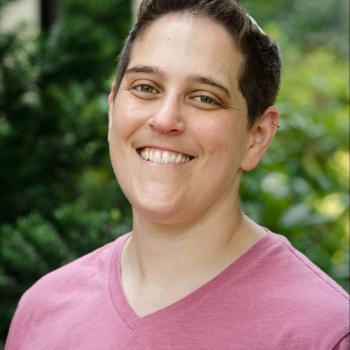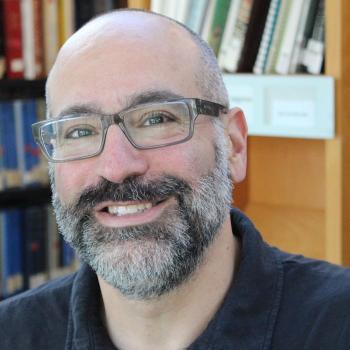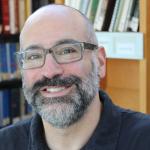While talking with a couple of other dads from my community, we found ourselves commiserating about how much more we wanted to be involved in work for social change. The reason we couldn’t do so, we all agreed, was parenting. None of us complained about time spent with family – we were happily gathered with our toddlers and spouses at a Hanukkah get together – but we wished we could do both.
The conversation struck a deep chord in me. How many times have I felt a fire in the belly to dosomethingabout yet another injustice and instead had to take a deep breath and set it aside for another round of dishes? Even for those of us who are fortunate enough to have jobs that allow us some opportunity to pursue social change, there’s a desire to domorebecause the needs are so vast.
All our roles in the private sphere – not just parenting young children but all family obligations – can feel not only like obstacles to engaging in the public sphere, but so distant and irrelevant. Our private lives are filled with the joys and challenges of relating to those in our inner circle, while public action requires relating to people whom we usually don’t even know.
The stories of Joseph in the latter part of the book of Genesis seem to be squarely on the private side of this divide; these dramatic narratives tell the painful tale of intergenerational family dysfunction. In fact, one could describe these texts as a private familial prelude to the public politics of the Book of Exodus, containing important (often cautionary) material about how to participate (or not) in the life of family, how to relate to our own.
A Hasidic teaching on this week’s dramatic interaction between Joseph as viceroy and his unsuspecting brothers has me thinking that there is more than just caution and private reconciliation to be found here
Judah’s deeply vulnerable, unwittingly repentant speech to Joseph begins, “And Judah approached him.” Rabbi Menahem Mendel of Vitebsk (d. 1788) uses this opening verb to paint a vivid picture of what it means to take a risk to approach another and effect change.
He begins by building on a comment by an earlier commentator, Rabbi Haim Ibn Atar (d. 1743) on this verse, “Judah endeavored to turn Joseph’s heart to himself.” This approach, says Rabbi Menahem Mendel, calls to mind the statement in Proverbs 27:19, “As face answers to face in water, so does one heart to another.” Building on this textual connection, the Hasidic master claims that to effect Joseph’s heart, Judah had to first work on his own heart, “approach[ing] him in his heart, drawing near to Joseph and truly loving” him. This, in turn would spark Joseph’s care and compassion.1
In contemporary psychological language, this is akin to emotional mirroring. Because human hearts are so attuned to each other, one’s emotional output can elicit a similar response in another person. It is a brilliant insight: rather than reacting in fear and resentment – girding himself for a violent confrontation (as some classical interpreters suggest) – Judah generated positive feelings in himself to draw out the same in Joseph and transform the interaction from one of antagonism to connection.
This seems like wise counsel for anyone dealing with a difficult family situation. But there is a hitch: at this moment in the biblical story, Judah doesn’t yet know he is approaching his long-lost brother; he thinks he is approaching a foreign ruler.
Rabbi Menahem Mendel is attentive to this detail and actually marvels at how Judah was able to generate such love for Joseph, believing he was an Egyptian. It was an example, the rabbi says, of a practice one should always pursue: find something with which to identify in everyone and everything, seek to make a loving connection with the other, and remember that all comes from God.
What seemed like a strategy for relating to those closest to us is also a method for approaching those we perceive as others. Judah’s mistaken impression that Joseph is a cruel Egyptian ruler is what makes the interpretation relevant to the public sphere – it makes this family story a communal and political one as well.
There is a fascinating tension embedded in this interpretation: it hinges on and gains force from both Judah’s belief that they are not brothers, and the fact that they are brothers! The interpretation is predicated on Judah not recognizing that Joseph is his brother, and that’s part of what makes Judah’s approach so impressive. But at the same time, his approach wouldn’t be so impressive if it hadn’t worked– his speech, begun with this approach, breaks the dam holding back Joseph’s tears and leads him to reveal himself, and reconcile with and save his family. In fact, there would be nothing around which to build an interpretation if the attempt had failed. So it wasn’t merely nice for Judah to cultivate love for the Egyptian, it was effective. And it wouldn’t have been effective if Joseph hadn’t, in fact, actually been his brother! It was remarkable that Judah was able to arouse love in himself for this stranger. But that reaching across the divide only worked because in fact the divide was illusory – Judah and Joseph were truly brothers. It is that contradiction that makes this interpretation relevant both in the private and public realms, both when we think we’re dealing with our own and when we think we’re dealing with the other.
Conflict, whether personal or public, draws us into its own harsh logic, and emotional mirroring works as well with anger as with love. When we generate some kind of positive feeling for the other – when we can at least temporarily expect the best of them – we can change the valence of the interaction, and often get a more positive result.
When I was a congregation-based community organizer, our community leaders approached officials with respect – even when there was tension – and with a genuine hopefulness that they could do right. This approach doesn’t always work – sometimes that imperial viceroy is just that – and in those situations, we’d stay away. Yet, whenever we thought there was a possibility to make a positive connection, we worked to assume – and thereby generate – the best. Though Judah didn’t believe that he and the viceroy were brothers, he acted as if they were, and in doing so he discovered that in fact they were.
And so, the line between politics and family is not so clear. Sometimes a family member can seem like an intractable foe, sometimes a government official turns out to be a sibling. When we practice generating love for family members in difficult moments, we may actually be better prepared to do the same in the public sphere, sometimes discovering unexpected allies. I’ll try it this evening in the bedtime power struggle with my three-year-old, and I’ll hope to try it again soon in the struggle for social change.
1Rabbi Menahem Mendel of Vitebsk, translated by Arthur Green, et al. Speaking Torah: Spiritual Teachings from around the Maggid’s Table (Woodstock, Vermont: Jewish Lights Publishing, 2013), p 153.
 Rabbi Josh Weisman is the Jewish Emergent Network Rabbinic Fellow at the Kavana Cooperative in Seattle, WA. He is a 2018 graduate of the Rabbinical School of Hebrew College.
Rabbi Josh Weisman is the Jewish Emergent Network Rabbinic Fellow at the Kavana Cooperative in Seattle, WA. He is a 2018 graduate of the Rabbinical School of Hebrew College.
Interested in a possible career in the rabbinate? Read Rabbi Dan Judson’s article “Jewish Lessons on Meaningful Work.“ Rabbi Judson is Dean of the Rabbinical School of Hebrew College. He has a Ph.D. in Jewish history from Brandeis University.












